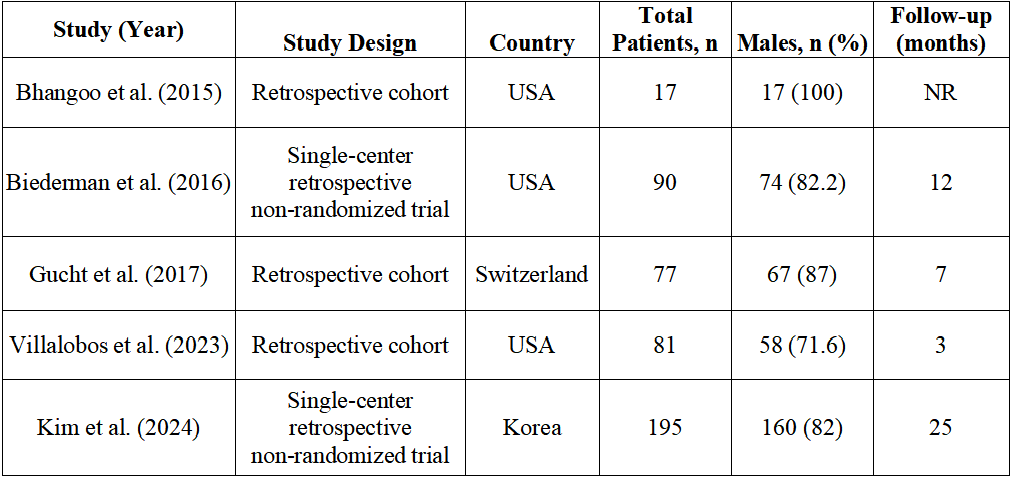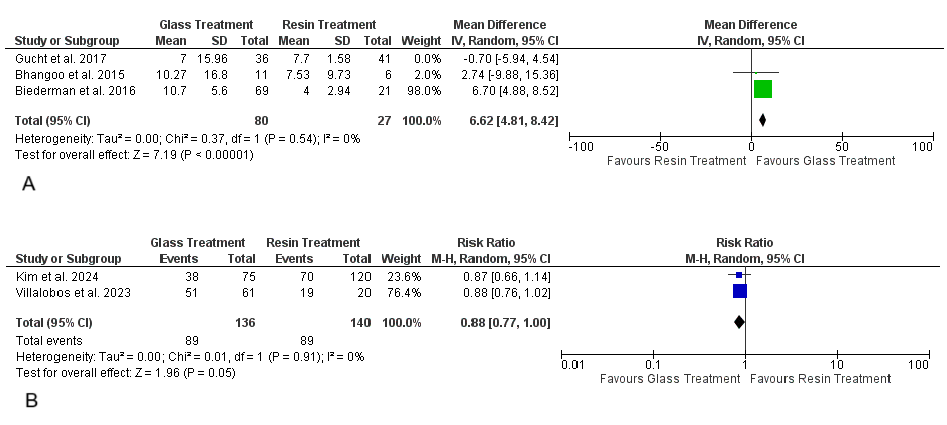Monday Poster Session
Category: Liver
P3703 - Comparative Efficacy and Safety of Yttrium-90 Glass vs Resin-Based Microspheres in Hepatocellular Carcinoma Treatment: A Systematic Review and Meta-Analysis
Monday, October 27, 2025
10:30 AM - 4:00 PM PDT
Location: Exhibit Hall
- NK
Nihal Khan, MD
Department of Internal Medicine, AdventHealth Orlando
Orlando, FL
Presenting Author(s)
Dawood Javed, MBBS1, Arsalan Nadeem, MBBS2, Abdullah Javed, MBBS3, Nihal Khan, MD4, Muhammad Hamza Shoaib, MBBS3, Faran Ahmed Jajja, MBBS1, Syeda Takreem Fatima, MBBS5, Muhammad Dawood Tariq, MBBS1, Ahmed Jahanzeb, MBBS6, Ubsar Zaki Butt, MBBS7, Aswa Arshad, MBBS7, Mahnoor Sabir, MBBS7
1Lahore Medical and Dental College, Lahore, Punjab, Pakistan; 2Northwestern University, Chicago, IL; 3Allama Iqbal Medical College, Lahore, Punjab, Pakistan; 4Department of Internal Medicine, AdventHealth Orlando, Orlando, FL; 5Services Institute of Medical Sciences, Lahore, Punjab, Pakistan; 6University College of Medicine and Dentistry, University of Lahore, Lahore, Punjab, Pakistan; 7Rashid Latif Medical College, Jersey City, NJ
Introduction: Hepatocellular carcinoma (HCC), a leading cause of cancer mortality, is frequently unresectable. Transarterial radioembolization (TARE), a minimally invasive catheter-based procedure, delivers Yttrium-90 (⁹⁰Y) microspheres intra-arterially to irradiate tumours selectively while sparing healthy liver. Glass (TheraSphere) and resin (SIR-Spheres) based microspheres are used, but comparative outcomes remain debated. This systematic review and meta-analysis evaluates the efficacy and safety of glass versus resin microspheres for HCC in clinical practice.
Methods: A systematic search was conducted through PubMed, Embase, Web of Science, and ClinicalTrials.gov from inception to April 2025 using keywords to identify relevant studies. Case reports, commentaries, non-human research, duplicates, and studies lacking data on glass or resin-based spheres were excluded. The primary endpoints were overall survival (OS), objective response rate (ORR), and disease control rate (DCR). Secondary outcomes included laboratory and clinical toxicities. Random-effects meta-analysis was conducted with Review Manager 5.4 to pool data and calculate risk ratios (RR) and mean difference (MD). A leave-one-out sensitivity analysis was done to assess the effects of individual studies on the overall result.
Results: Five studies with 460 patients (252 glass, 208 resin) were analyzed – two retrospective non-randomized trials and three retrospective cohort studies. The population included 376 males (81.7%) with mean or median ages ranging from 60 to 69 years. Baseline characteristics are summarized in Table 1. No significant difference was observed in OS (MD 3.42, 95% CI, -2.42 to 9.26; p = 0.25), ORR (RR 0.94, 95% CI, 0.68 to 1.28; p = 0.68) and DCR (RR 0.97, 95% CI, 0.88 to 1.07; p = 0.56) between the two groups. Glass microspheres exhibited similar laboratory (bilirubin, albumin and aspartate/alanine transaminase) and clinical (pain, nausea, fatigue and anorexia) toxicities compared to resin microspheres. Sensitivity analysis favored glass microspheres with improved OS (MD 6.62, 95% CI, 4.81 to 8.42; p < 0.01, I² = 0%) and ORR (RR 0.88, 95% CI, 0.77 to 1.00; p = 0.05, I² = 0%). Forest plots are shown in Figure 1.
Discussion: Glass and resin microspheres exhibit comparable efficacy and safety for the treatment of HCC. Sensitivity analysis suggests potential OS and ORR advantages with glass microspheres, warranting validation in larger randomized trials to optimize microsphere selection in specific subpopulations.

Figure: Table 1: Baseline patient characteristics. NR Not Reported

Figure: Figure 1: Forest plots for the sensitivity analysis of glass versus resin-based microspheres. A: Overall survival. B: Objective response rate.
Disclosures:
Dawood Javed indicated no relevant financial relationships.
Arsalan Nadeem indicated no relevant financial relationships.
Abdullah Javed indicated no relevant financial relationships.
Nihal Khan indicated no relevant financial relationships.
Muhammad Hamza Shoaib indicated no relevant financial relationships.
Faran Ahmed Jajja indicated no relevant financial relationships.
Syeda Takreem Fatima indicated no relevant financial relationships.
Muhammad Dawood Tariq indicated no relevant financial relationships.
Ahmed Jahanzeb indicated no relevant financial relationships.
Ubsar Zaki Butt indicated no relevant financial relationships.
Aswa Arshad indicated no relevant financial relationships.
Mahnoor Sabir indicated no relevant financial relationships.
Dawood Javed, MBBS1, Arsalan Nadeem, MBBS2, Abdullah Javed, MBBS3, Nihal Khan, MD4, Muhammad Hamza Shoaib, MBBS3, Faran Ahmed Jajja, MBBS1, Syeda Takreem Fatima, MBBS5, Muhammad Dawood Tariq, MBBS1, Ahmed Jahanzeb, MBBS6, Ubsar Zaki Butt, MBBS7, Aswa Arshad, MBBS7, Mahnoor Sabir, MBBS7. P3703 - Comparative Efficacy and Safety of Yttrium-90 Glass vs Resin-Based Microspheres in Hepatocellular Carcinoma Treatment: A Systematic Review and Meta-Analysis, ACG 2025 Annual Scientific Meeting Abstracts. Phoenix, AZ: American College of Gastroenterology.
1Lahore Medical and Dental College, Lahore, Punjab, Pakistan; 2Northwestern University, Chicago, IL; 3Allama Iqbal Medical College, Lahore, Punjab, Pakistan; 4Department of Internal Medicine, AdventHealth Orlando, Orlando, FL; 5Services Institute of Medical Sciences, Lahore, Punjab, Pakistan; 6University College of Medicine and Dentistry, University of Lahore, Lahore, Punjab, Pakistan; 7Rashid Latif Medical College, Jersey City, NJ
Introduction: Hepatocellular carcinoma (HCC), a leading cause of cancer mortality, is frequently unresectable. Transarterial radioembolization (TARE), a minimally invasive catheter-based procedure, delivers Yttrium-90 (⁹⁰Y) microspheres intra-arterially to irradiate tumours selectively while sparing healthy liver. Glass (TheraSphere) and resin (SIR-Spheres) based microspheres are used, but comparative outcomes remain debated. This systematic review and meta-analysis evaluates the efficacy and safety of glass versus resin microspheres for HCC in clinical practice.
Methods: A systematic search was conducted through PubMed, Embase, Web of Science, and ClinicalTrials.gov from inception to April 2025 using keywords to identify relevant studies. Case reports, commentaries, non-human research, duplicates, and studies lacking data on glass or resin-based spheres were excluded. The primary endpoints were overall survival (OS), objective response rate (ORR), and disease control rate (DCR). Secondary outcomes included laboratory and clinical toxicities. Random-effects meta-analysis was conducted with Review Manager 5.4 to pool data and calculate risk ratios (RR) and mean difference (MD). A leave-one-out sensitivity analysis was done to assess the effects of individual studies on the overall result.
Results: Five studies with 460 patients (252 glass, 208 resin) were analyzed – two retrospective non-randomized trials and three retrospective cohort studies. The population included 376 males (81.7%) with mean or median ages ranging from 60 to 69 years. Baseline characteristics are summarized in Table 1. No significant difference was observed in OS (MD 3.42, 95% CI, -2.42 to 9.26; p = 0.25), ORR (RR 0.94, 95% CI, 0.68 to 1.28; p = 0.68) and DCR (RR 0.97, 95% CI, 0.88 to 1.07; p = 0.56) between the two groups. Glass microspheres exhibited similar laboratory (bilirubin, albumin and aspartate/alanine transaminase) and clinical (pain, nausea, fatigue and anorexia) toxicities compared to resin microspheres. Sensitivity analysis favored glass microspheres with improved OS (MD 6.62, 95% CI, 4.81 to 8.42; p < 0.01, I² = 0%) and ORR (RR 0.88, 95% CI, 0.77 to 1.00; p = 0.05, I² = 0%). Forest plots are shown in Figure 1.
Discussion: Glass and resin microspheres exhibit comparable efficacy and safety for the treatment of HCC. Sensitivity analysis suggests potential OS and ORR advantages with glass microspheres, warranting validation in larger randomized trials to optimize microsphere selection in specific subpopulations.

Figure: Table 1: Baseline patient characteristics. NR Not Reported

Figure: Figure 1: Forest plots for the sensitivity analysis of glass versus resin-based microspheres. A: Overall survival. B: Objective response rate.
Disclosures:
Dawood Javed indicated no relevant financial relationships.
Arsalan Nadeem indicated no relevant financial relationships.
Abdullah Javed indicated no relevant financial relationships.
Nihal Khan indicated no relevant financial relationships.
Muhammad Hamza Shoaib indicated no relevant financial relationships.
Faran Ahmed Jajja indicated no relevant financial relationships.
Syeda Takreem Fatima indicated no relevant financial relationships.
Muhammad Dawood Tariq indicated no relevant financial relationships.
Ahmed Jahanzeb indicated no relevant financial relationships.
Ubsar Zaki Butt indicated no relevant financial relationships.
Aswa Arshad indicated no relevant financial relationships.
Mahnoor Sabir indicated no relevant financial relationships.
Dawood Javed, MBBS1, Arsalan Nadeem, MBBS2, Abdullah Javed, MBBS3, Nihal Khan, MD4, Muhammad Hamza Shoaib, MBBS3, Faran Ahmed Jajja, MBBS1, Syeda Takreem Fatima, MBBS5, Muhammad Dawood Tariq, MBBS1, Ahmed Jahanzeb, MBBS6, Ubsar Zaki Butt, MBBS7, Aswa Arshad, MBBS7, Mahnoor Sabir, MBBS7. P3703 - Comparative Efficacy and Safety of Yttrium-90 Glass vs Resin-Based Microspheres in Hepatocellular Carcinoma Treatment: A Systematic Review and Meta-Analysis, ACG 2025 Annual Scientific Meeting Abstracts. Phoenix, AZ: American College of Gastroenterology.
